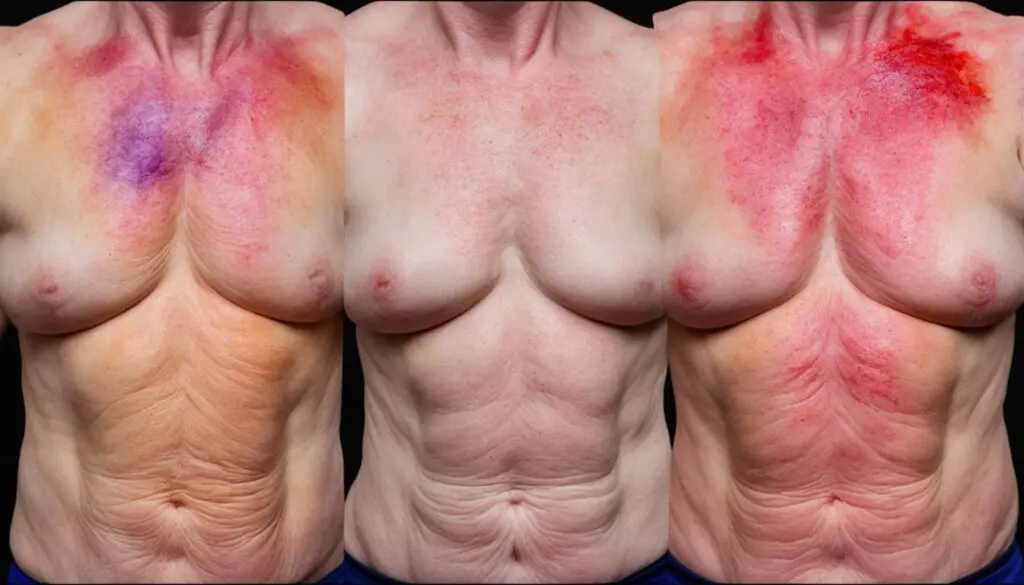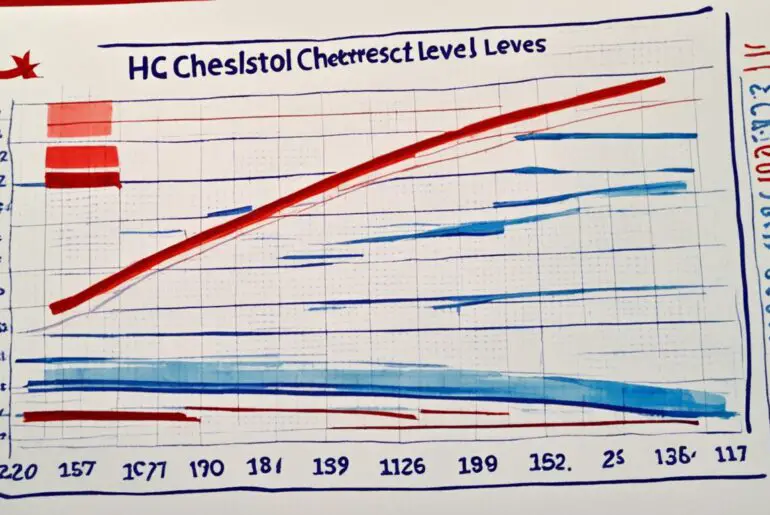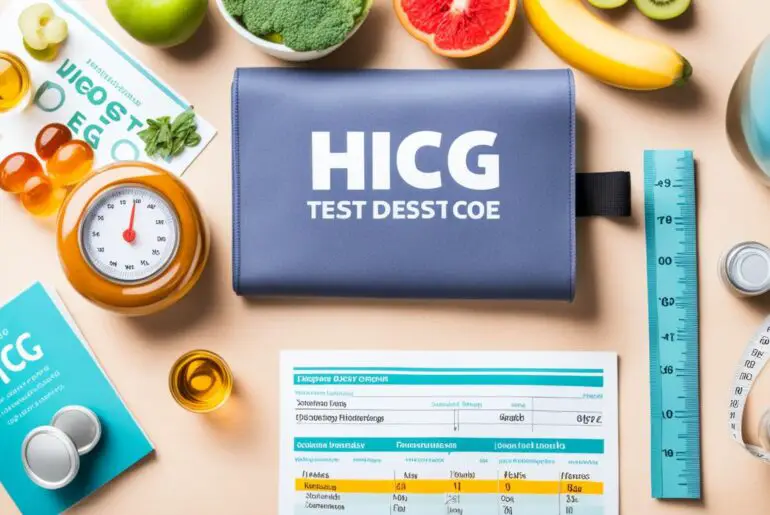Have you ever considered the HCG diet protocol as a weight loss option? While it may promise quick results, there are important factors to consider, especially when it comes to your skin health. Did you know that severe calorie restriction and the use of HCG hormone supplements can lead to skin reactions? You may be wondering, what kind of reactions can occur and how can they be managed?
Let’s dive deeper into the world of the HCG diet and its potential impact on your skin. We will explore common skin reactions, such as rashes, hives, irritation, and increased sensitivity, and provide tips on how to manage them. It’s important to prioritize your skin health while pursuing any weight loss regimen.
Key Takeaways:
- The HCG diet protocol, involving severe calorie restriction and the use of HCG hormone supplements, can cause skin reactions.
- Skin reactions may include rashes, hives, irritation, and increased sensitivity.
- If you experience skin reactions, it is recommended to discontinue the diet and seek guidance from a healthcare professional.
- Managing skin reactions involves topical treatments and practicing good skincare habits.
- Consider safer weight loss options such as a balanced diet and regular exercise for long-term and sustainable results.
Understanding the HCG Diet Protocol
The HCG diet protocol combines severe calorie restriction with the use of HCG hormone supplements. HCG, also known as human chorionic gonadotropin, is a hormone primarily produced during pregnancy and used to treat fertility issues. However, it is important to note that the FDA has not approved it for over-the-counter weight loss.
The diet protocol typically involves consuming just 500 to 800 calories per day, which is a severe calorie restriction. The goal is to induce weight loss quickly, but the safety and effectiveness of this approach have not been proven.
Before considering the HCG diet protocol as a weight loss option, it is crucial to understand the risks and limitations associated with it. Consulting with a healthcare professional is essential to ensure the best course of action for your health and well-being.
Potential Skin Reactions to the HCG Diet Protocol
Skin reactions are common side effects reported by individuals following the HCG diet protocol. These reactions can manifest as skin rash, hives, skin irritation, and increased skin sensitivity. While the exact cause of these reactions is not well understood, they may be attributed to the combination of severe calorie restriction and the use of HCG hormone supplements.
It’s important to note that not everyone will experience skin reactions while on the HCG diet. Individual experiences may vary. However, if you do encounter any skin issues, it is highly recommended to discontinue the diet and consult with a healthcare professional for further guidance and evaluation.
Quotes:
“Skin reactions, such as rash and hives, are potential side effects of the HCG diet protocol. If you notice any skin irritation or increased sensitivity while following the diet, it’s crucial to seek medical advice.” – Dr. Emma Richards, Dermatologist
Common Skin Reactions on the HCG Diet Protocol
| Skin Reactions | Description |
|---|---|
| Skin Rash | A general term for any abnormal changes in the skin’s appearance, such as redness, itching, or inflammation. |
| Hives | Itchy, raised welts on the skin that can vary in size and shape and often appear suddenly. |
| Skin Irritation | Redness, itching, or discomfort on the skin’s surface. |
| Skin Sensitivity | An increased or heightened response of the skin to various stimuli, causing discomfort or pain. |
The table above provides a summary of common skin reactions that individuals may experience while on the HCG diet protocol. It is essential to be aware of these potential skin reactions and take appropriate action if they occur.
Managing Skin Reactions on the HCG Diet Protocol

If you experience skin reactions while on the HCG diet protocol, it is important to take proactive steps to manage them. Prioritizing your skin health and seeking proper care can help alleviate symptoms and promote healing.
Firstly, it is crucial to discontinue the diet and consult with a healthcare professional for evaluation and guidance. They will assess your skin reactions and provide appropriate recommendations for treatment.
“Consult with a healthcare professional for evaluation and guidance.”
Your healthcare professional may recommend topical treatments, such as soothing creams or ointments, to alleviate the symptoms and reduce skin irritation. These treatments can help moisturize the affected area and ease discomfort.
“Your healthcare professional may recommend topical treatments, such as soothing creams or ointments.”
In addition to medical interventions, practicing good skincare habits is essential in managing skin reactions. Gentle cleansing of the affected area with mild, non-irritating cleansers can help remove any potential irritants and maintain skin hygiene.
Moisturizing is another crucial step in managing skin reactions. Applying a moisturizer that is specifically formulated for sensitive skin can help restore the skin’s natural barrier function and prevent excessive dryness or flakiness.
Avoiding irritants such as harsh soaps, fragrances, and cosmetic products can also minimize the impact of skin reactions. Opt for gentle, fragrance-free formulations and perform patch tests before using any new skincare products.
“Practicing good skincare habits, including gentle cleansing, moisturizing, and avoiding irritants, can help minimize the impact of skin reactions.”
To summarize, if you experience skin reactions while on the HCG diet protocol:
- Discontinue the diet and consult with a healthcare professional for evaluation and guidance.
- Follow the recommended topical treatments to alleviate symptoms and promote healing.
- Adopt good skincare habits, including gentle cleansing, moisturizing, and avoiding irritants.
By taking these steps, you can effectively manage skin reactions and prioritize your skin health while navigating the HCG diet protocol.
| Tips for Managing Skin Reactions on the HCG Diet Protocol |
|---|
| Discontinue the diet and consult with a healthcare professional for evaluation and guidance. |
| Follow recommended topical treatments, such as soothing creams or ointments, to alleviate symptoms and promote healing. |
| Practice good skincare habits, including gentle cleansing, moisturizing, and avoiding irritants. |
Safer Weight Loss Options
While the HCG diet protocol may offer short-term weight loss, there are safer options for achieving long-term and sustainable weight loss. It is important to prioritize permanent weight loss through lifestyle changes, such as adopting a balanced diet and engaging in regular exercise.
A balanced diet should focus on nutrient-dense foods, including fruits, vegetables, lean proteins, and whole grains. These provide essential vitamins, minerals, and antioxidants that support overall health and weight management. It is also important to limit processed foods and added sugars, as they can contribute to weight gain and negatively impact health.
Regular exercise plays a crucial role in weight loss and overall well-being. It helps burn calories, build lean muscle mass, improve metabolism, and enhance cardiovascular health. Incorporating both cardio exercises (such as running, cycling, or swimming) and strength training (such as weightlifting or bodyweight exercises) into your routine can maximize the benefits of exercise.
Consulting with a healthcare professional or a registered dietitian can provide personalized guidance and support in developing a safe and effective weight loss plan. They can help tailor a diet and exercise regimen to your specific needs, taking into account any underlying health conditions or dietary restrictions you may have.
“A balanced diet and regular exercise are the pillars of sustainable weight loss.”
Benefits of Safer Weight Loss Options:
- Long-term and sustainable weight loss
- Improved overall health and well-being
- Increased energy levels
- Enhanced cardiovascular health
- Reduced risk of chronic diseases, such as heart disease and diabetes
By adopting safer weight loss options, you can achieve your desired weight goals while prioritizing your health and well-being. Remember, weight loss is a journey, and it’s important to approach it with patience, consistency, and a focus on long-term success.
| Benefits | Safer Weight Loss Options | HCG Diet Protocol |
|---|---|---|
| Long-term and sustainable weight loss | ✓ | ✗ |
| Improved overall health and well-being | ✓ | ✗ |
| Increased energy levels | ✓ | ✗ |
| Enhanced cardiovascular health | ✓ | ✗ |
| Reduced risk of chronic diseases | ✓ | ✗ |
Risks and Side Effects of the HCG Diet Protocol

The HCG diet protocol has gained attention for its potential weight loss benefits. However, it is important to consider the risks and potential side effects associated with this diet plan. Severe calorie restriction, a hallmark of the HCG diet, can have serious consequences on your health.
Nutritional Deficiencies
One of the main concerns with the HCG diet protocol is the limited intake of essential vitamins and minerals. By severely restricting calorie intake, you may not be getting enough nutrients to support your body’s needs. This can lead to nutritional deficiencies, which can negatively impact your overall health and well-being.
Gallstone Formation
Another risk of the HCG diet protocol is the potential formation of gallstones. Rapid weight loss can disrupt the balance of bile salts and cholesterol in the bile, leading to the formation of gallstones. These stones can cause severe pain and may require medical intervention.
Irregular Heartbeat
Severe calorie restriction can also affect your heart health. The limited intake of calories and nutrients can disrupt the balance of electrolytes in your body, leading to an irregular heartbeat. This can be dangerous and requires medical attention.
Side Effects on Skin Health
While not life-threatening, the HCG diet protocol can also have side effects on your skin. Skin reactions such as rash, irritation, and increased sensitivity have been reported by individuals following this diet plan. These side effects can be bothersome and may impact your overall comfort.
It is important to consider these risks and potential side effects before embarking on the HCG diet protocol. Consulting with a healthcare professional is crucial in order to make an informed decision about your weight loss journey.
| Risks and Side Effects | Impact |
|---|---|
| Gallstone formation | Can cause severe pain and may require medical intervention |
| Irregular heartbeat | Can be dangerous and requires medical attention |
| Nutritional deficiencies | Can negatively impact overall health and well-being |
| Skin reactions | Rash, irritation, and increased sensitivity |
Remember that weight loss should always be approached with caution and prioritizing your overall health. There are safer and more sustainable weight loss options available that do not carry the same risks as the HCG diet protocol.
The Role of HCG in the Body
HCG, or human chorionic gonadotropin, is a hormone primarily produced during pregnancy. Its role is to support the development of the fetus and maintain pregnancy.
In the context of the HCG diet protocol, HCG is used as a supplement to promote weight loss. Despite its primary function being related to pregnancy, HCG has also been used in men to address certain medical conditions such as low testosterone and infertility.
One of the notable roles of HCG is its ability to stimulate testosterone production in men. Testosterone is a hormone responsible for various aspects of male reproductive health and plays a crucial role in fertility. HCG can help increase testosterone levels, potentially improving fertility in men with hypogonadism.
However, it is important to note that the use of HCG for weight loss is not scientifically supported. While HCG may have some benefits in certain medical contexts, its effectiveness and safety for weight loss have not been proven.
Comparing the Uses of HCG
| Context | Primary Use | Effectiveness |
|---|---|---|
| Pregnancy | Supports fetal development and maintains pregnancy | Proven and essential for pregnancy |
| HCG Diet Protocol | Supplement for weight loss | Not scientifically supported |
| Men’s Health | Treatment for low testosterone and infertility | Potentially effective for specific conditions |
Safe and Effective Use of HCG

The use of HCG should always be done under the guidance of a healthcare professional. In men, HCG injections may be prescribed to address conditions such as testosterone deficiency and infertility. These injections can help increase testosterone levels, maintain fertility, and improve sexual function.
However, it is crucial to follow proper dosing instructions and consider potential side effects.
“When used correctly and under medical supervision, HCG injections can be a valuable tool in managing testosterone deficiency and supporting reproductive health.”
It is important to note that the use of HCG for weight loss is not considered safe or effective. Weight loss should be approached through sustainable methods such as a balanced diet and regular exercise. Consult with a healthcare professional to determine if HCG is appropriate for addressing your specific health concerns and goals.
Table: Comparing HCG Injections for Testosterone Deficiency and Weight Loss
| Aspect | HCG Injections for Testosterone Deficiency | HCG Injections for Weight Loss |
|---|---|---|
| Primary Purpose | To address testosterone deficiency and related symptoms | Not recommended for weight loss |
| Prescription Requirement | Prescribed by a healthcare professional | Not approved for over-the-counter use |
| Potential Benefits | Increased testosterone levels, improved sexual function | No scientific evidence for weight loss benefits |
| Potential Risks | Allergic reactions, skin irritations | Unproven safety and potential side effects |
| Medical Supervision | Regular monitoring by a healthcare professional | Not recommended without medical guidance |
In conclusion, HCG injections can be a safe and effective treatment for testosterone deficiency and infertility when used under the guidance of a healthcare professional. However, they are not approved for over-the-counter use for weight loss and should not be considered as a standalone weight loss solution. Prioritize your health and consult with a healthcare professional to determine the appropriate use of HCG based on your individual circumstances.
Conclusion
The HCG diet protocol, with its severe calorie restriction and use of HCG hormone supplements, poses risks and potential side effects, including skin reactions such as rash, hives, irritation, and sensitivity. For safer and more sustainable weight loss, it is recommended to explore alternative options. Adopting a balanced diet that includes nutrient-dense foods and engaging in regular exercise can support long-term weight management goals.
It is important to understand the role of HCG in the body, primarily as a hormone produced during pregnancy and for treating specific medical conditions. Using HCG for weight loss is not supported by scientific evidence and should be approached with caution. To ensure safe use, consulting with a healthcare professional is crucial. They can provide personalized guidance and monitor your progress, taking into account your overall health and individual needs.
Prioritizing your health and well-being should always be at the forefront when considering any weight loss approach. Taking an informed and responsible approach to your journey can help you achieve your goals while minimizing potential risks. By making educated choices and seeking professional guidance, you can find a weight loss strategy that aligns with your specific needs and helps you achieve long-term success.
FAQ
What is the HCG diet protocol?
The HCG diet protocol involves severe calorie restriction, typically just 500 to 800 calories per day, along with the use of HCG hormone supplements.
What are the potential skin reactions to the HCG diet protocol?
Skin reactions that have been reported include skin rash, hives, skin irritation, and increased skin sensitivity.
How can I manage skin reactions on the HCG diet protocol?
If you experience skin reactions, it is important to discontinue the diet and consult with a healthcare professional. They may recommend topical treatments and advise on proper skincare habits.
What are some safer weight loss options?
Safer weight loss options include adopting a balanced diet and engaging in regular exercise for long-term and sustainable weight loss.
What are the risks and side effects of the HCG diet protocol?
Risks and side effects may include gallstone formation, irregular heartbeat, limited intake of vitamins and minerals, and electrolyte imbalance.
What is the role of HCG in the body?
HCG is a hormone primarily produced during pregnancy. It helps support the development of the fetus and maintain pregnancy. It can also be used to address testosterone deficiency and infertility in men.
How can HCG be used safely and effectively?
The use of HCG should always be done under the guidance of a healthcare professional, such as for HCG injections to address testosterone deficiency or fertility issues. The use of HCG for weight loss is not considered safe or effective.




